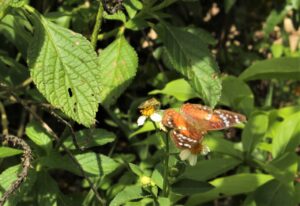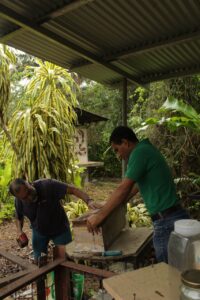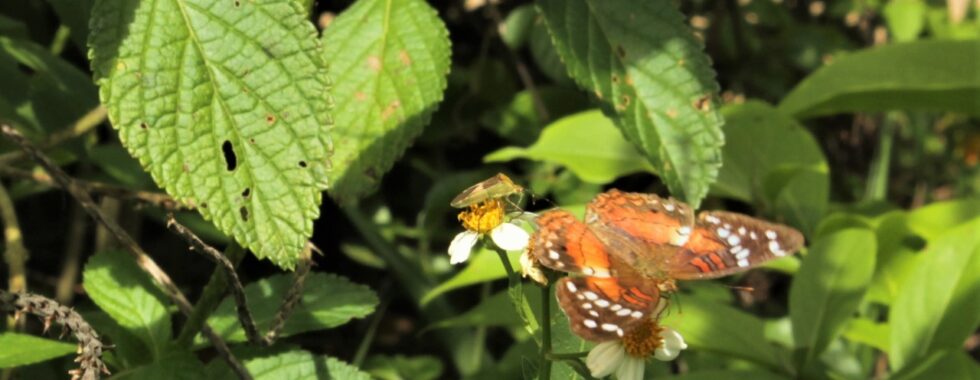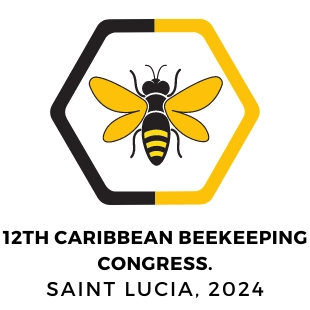Targeting Pollinator Management
As the world continues to grapple with the ever present impacts of climate change, a focus on the small organisms that power our plant production cannot be overlooked. Pollinators of every group may themselves be impacted by extreme weather events, alternation of natural weather patterns, and changes to our ‘seasons’ here in the Caribbean region. It is known that temperature changes and rainfall changes may impact the natural cycles of living things, plants and animals alike, and this may therefore be a cause for concern in respect of the sustainability of the ecosystem services which these organisms provide. The practice of pollinator management therefore comes into focus, as there is perhaps now a greater need to manage the organisms which generally provide us so many benefits, in order that they can continue to do so.
Pollinator Havens

Pollinator Garden
Pollinators have their individual niches and habitats where they are able to forage for food, live and reproduce. As weather patterns change, it may become more difficult to obtain these critical needs and this may impact their survival. Apart from these natural habits, more and more people are creating ‘havens’ for pollinators to provide greater opportunities for their survival. The Biodiversity and Ecosystem Services Network Trinidad and Tobago (BES-Net TT) project has been advocating for the development of pollinator gardens.
These are areas set aside for the specific purpose of attracting, feeding and providing shelter to pollinators. The more varied the plant selection, is the more varied the niches and microhabitats created for these organisms. BES-Net TT has encouraged the use of native plants as the majority rather than the minority choice of vegetation in these spaces. Native pollinator species have co-evolved with native plants, so while a sprinkling of exotic plants in these gardens are okay, the emphasis on native plants will encourage pollinators that are familiar with their floral architecture and nectar composition.
Water Supply
Pollinators, especially bees, require water supply to maintain their health. Bees collect water as well as nectar and pollen, using water for a variety of purposes in the hive including brood rearing and hive temperature regulation. Access to water can be impacted by extreme temperatures, and so back-up supply sources provided for them will assist in their management.
This does not require too much infrastructure, but simply provision of puddles, shallow birdbaths, or inclusion in gardens those plants that collect water, such as bromeliads and some types of heliconias. Shallow, rather than deep vessels are required: the saucers for flowerpots are of sufficient depth, providing temporary pools for the daytime hours when bees are active. Deeper bodies of water run the risk of becoming harmful to bees if they fall in, as bees are not good swimmers.
Artificial Hives

Artificial Hive Development
Like pollinator gardens, artificial hives for bees are important management tools. For the experienced honeybee beekeeper, hive maintenance practices will assist bee colonies in sustained development, as regular monitoring will guard against pests and disease and identify any issues that may impact negatively on the hive. For keepers of stingless bees, the value to bees is the same, but additionally, boxing of wild hives also saves colonies from habitat destruction due to felling of trees, fires and impairment of the natural environment in which these bees may have established their colonies.
Local stingless bee beekeepers in Trinidad and Tobago also can assist in expanding the population of bees through the practice of hive splitting and this has the potential for assisting farmers in crop production, through supply of colonies in hive boxes. This activity is not extensive at the current time, however through the BES-Net TT project, the awareness of stingless bees and the need for assistance in their management and proliferation has been built, along with interest in this type of beekeeping.
Networking for Management
Another way in which management of pollinators can increase is through the building of networks. In August 2023, BES-Net TT, collaborating with the Global Environment Facility Small Grants Programme (GEF SGP), brought together honeybee keepers, persons who participated in training in honeybee beekeeping and persons who attended workshops in stingless bee management for a networking event. At the event, the invitation was extended for the setting up of an informal network for Meliponini (stingless bees) beekeeping.
An outcome of the event was a WhatsApp group which was made up of a mix of honeybee and stingless bee beekeepers, as well as persons who have an interest in getting started in stingless bee beekeeping. In the months that followed, there was a rich exchange of information, questions were raised and responded to and photographic and video material was exchanged. Beyond what was and could be shared in the BES-Net TT workhsops, this WhatsApp community provided new learning among its members. Information on hive box designs and availability of colonies were exchanged and at least three new hives were obtained by persons through this networking activity.
Looking to the future
Apart from these tangible actions that can be taken to enhance and increase pollinator habitats, ongoing work must continue to advocate for protection of pollinators from the threat of indiscriminate pesticide use. Food production and food security in the Caribbean is still a way off from what is ideal, and the region’s food import bill is still at a high level. While the agricultural industry seeks to increase its production, the dots need to be connected between this target and the role that pollinators play in achieving the target.
Awareness of the various pesticide classes – those which are broad-spectrum, high in toxicity and have extended residual effects and those which are more environmentally friendly – needs to be built among the farming public as well as the backyard gardeners. Whereas Governments may have a checklist of the ‘safer’ chemicals and the ‘more harmful ones’ and even offer subsidies to farmers whose use the former, the harmful chemicals are still making their way into countries of the region and are being aggressively marketed, purchased and used, to the detriment of the important organisms that are needed to carry out pollination.

Theory of Change process
In Trinidad and Tobago, a first step is being taken to clearly articulate the steps that need to be taken to arrive at a more informed population in harmony with effective management of pollinators. Key stakeholders recently took part in a Theory of Change workshop which defined key actors and actions needed in order to develop a national strategy for pollinator management. Using a targeted approach with specific outcomes and a clear impact statement, the process has begun to secure our pollinator heritage and keep it alive and well.


